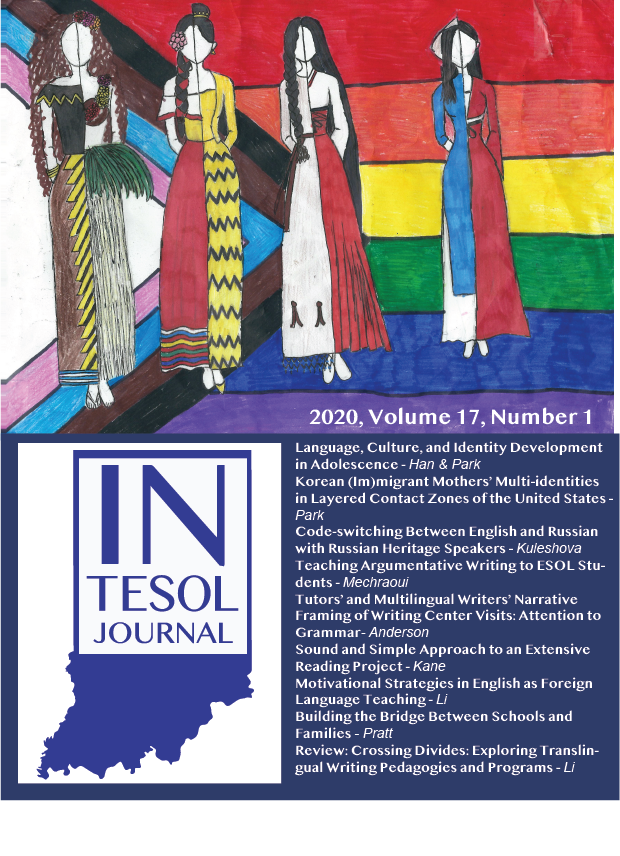Motivational Strategies in English as Foreign Language Teaching: a research review
DOI:
https://doi.org/10.18060/24393Keywords:
motivational strategies, EFL, motivational theories, reviewAbstract
The paper aims to review and synthesize the research literature relating to the use and effectiveness of motivational strategies in English as a Foreign Language (EFL) teaching. First, an overview is presented of the prestigious empirical studies (10) across the world that provided evidence for the impact of motivational strategies on enhancing students’ English learning motivations. Then, different research methodologies are assessed, effective motivational strategies both across different cultural contexts and culture-dependent are identified and the outcomes of the applications of motivational strategies are discussed. Finally, the limitations of the related research are explored and implications for future motivational strategies research are provided.
References
Alrabai, F. (2016). The Effects of Teachers’ In-Class Motivational Intervention on Learners' EFL Achievement. Applied Linguistics, 37(3), 307-333. http://doi:10.1093/applin/amu021
Assor, A., Kaplan, H., & Roth, G. (2002). Choice is good, but relevance is excellent: Autonomy‐enhancing and suppressing teacher behaviours predicting students’ engagement in schoolwork. British journal of educational psychology, 72(2), 261-278. https://doi.org/10.1348/000709902158883
Chambers, G. N. (1999). Motivating language learners (Vol. 12). Multilingual Matters.
Cheng, H. F., & Dörnyei, Z. (2007). The use of motivational strategies in language instruction: The case of EFL teaching in Taiwan. International Journal of Innovation in Language Learning and Teaching, 1(1), 153-174. https://doi.org/10.2167/illt048.0
Dörnyei, Z. (1994). Motivation and motivating in the foreign language classroom. The modern language journal, 78(3), 273-284.
Dornyei, Z. (2001). Motivational Strategies in the Language Classroom. Cambridge: Cambridge University Press. http://dx.doi.org/10.1017/CBO9780511667343
Dörnyei, Z. (2008). Motivation strategies in the language classroom. Ernst Klett Sprachen.
Dörnyei, Z., & Csizér, K. (1998). Ten commandments for motivating language learners: Results of an empirical study. Language teaching research, 2(3), 203-229.
Eccles, J., Adler, T. F., Futterman, R., Goff, S. B., Kaczala, C. M., Meece, J. L., & Midgley, C. (1983). Expectations, values and academic behaviors. In J. T. Spence (Ed.), Achievement and achievement motivation (pp. 75–146). San Francisco, CA: Freeman.
Eccles, J. S., Midgley, C., Wigfield, A., Buchanan, C. M., Reuman, D., Flanagan, C., & MacIver, D. (1993). Development during adolescence: The impact of stage–environment fit on young adolescents’ experiences in schools and in families. American Psychologist, 48, 90–101.
Epstein, J. L., & McPartland, J. M. (1976). The concept and measurement of the quality of school life. American Educational Research Journal, 13, 15–30.
Gardner, R.C. (1985) Social Psychology and Second Language Learning: The Role of Attitudes and Motivation. London: Edward Arnold.
Gardner, R. C., & Lambert, W. E. (1959). Motivational variables in second-language acquisition. Canadian Journal of Psychology/Revue canadienne de psychologie, 13(4), 266.
Gardner, R.C. and Lambert, W.E. (1972) Attitudes and Motivation in Second Language Learning. Rowley, MA: Newbury House.
Gardner, R. C., & Tremblay, P. F. (1994). On Motivation, Research Agendas, and Theoretical Frameworks 1. The Modern Language Journal, 78(3), 359-368.
Guilloteaux, M. J. (2013). Motivational strategies for the language classroom: Perceptions of Korean secondary school English teachers. System, 41(1), 3-14. https://doi:10.1016/j.system.2012.12.002
Guilloteaux, M. J., & Dörnyei, Z. (2008). Motivating language learners: A classroom‐oriented investigation of the effects of motivational strategies on student motivation. TESOL Quarterly, 42(1), 55-77. https://doi.org/10.1002/j.1545-7249.2008.tb00207.x
Lee, T. S., Gardner, D., & Lau, K. (2019). The effects of L2 motivational strategies: within and beyond the L2 classroom. Innovation in Language Learning and Teaching, 1-15.
Lee, T. S., & Lin, S. Y. (2019). English teachers’ uses of motivational strategies beyond an established framework. Educational Research, 1-18. https://doi.org/10.1080/00131881.2019.1677170
Littlewood, W. (2000). Do Asian students really want to listen and obey? ELT, 54(1), 31-36
Moskovsky, C., Alrabai, F., Paolini, S., & Ratcheva, S. (2013). The Effects of Teachers’ Motivational Strategies on Learners’ Motivation: A Controlled Investigation of Second Language Acquisition. Language Learning, 63(1), 34-62. http://doi:10.1111/j.1467-9922.2012.00717.x
Oxford, R., & Shearin, J. (1994). Language learning motivation: Expanding the theoretical framework. The modern language journal, 78(1), 12-28.
Oxford, R. L., & Shearin, J. (1996). Language learning motivation in a new key. Language learning motivation: Pathways to the new century, 11(1), 121-144.
Papi, M., & Abdollahzadeh, E. (2012). Teacher Motivational Practice, Student Motivation, and Possible L2 Selves: An Examination in the Iranian EFL Context. Language Learning, 62(2), 571-594. http://doi:10.1111/j.1467-9922.2011.00632.x
Ryan, R. M., & Deci, E. L. (2000). Self-determination theory and the facilitation of intrinsic motivation, social development, and well-being. American psychologist, 55(1), 68. https://doi.org/10.1037/0003-066x.55.1.68
Sugita McEown, M., & Takeuchi, O. (2014). Motivational strategies in EFL classrooms: how do teachers impact students’ motivation? Innovation in Language Learning and Teaching, 8(1), 20-38. https://doi.org/10.1080/17501229.2012.741133
Wigfield, A., & Eccles, J. S. (1992). The development of achievement task values: A theoretical analysis. Developmental Review, 12(3), 265-310.
Wigfield, A., & Eccles, J. S. (2000). Expectancy–value theory of achievement motivation. Contemporary Educational Psychology, 25(1), 68-81. https://doi.org/10.1006/ceps.1999.1015
Williams, M., & Burden, R. L. (1997). Psychology for Language Teachers: A Social Constructivist Approach. NY: Cambridge University Press
Wong, N. Y. (2008). Confucian heritage culture learner’s phenomenon: From “exploring the middle zone” to “constructing a bridge”. ZDM, 40(6), 973-981. https://doi.org/10.1007/s11858-008-0140-x
Wong, R. M. (2014). An investigation of strategies for student motivation in the Chinese EFL context. Innovation in Language Learning and Teaching, 8(2), 132-154. https://doi.org/10.1080/17501229.2013.777449
Downloads
Published
Issue
Section
License
Copyright (c) 2020 haiyan li

This work is licensed under a Creative Commons Attribution-NonCommercial 4.0 International License.


